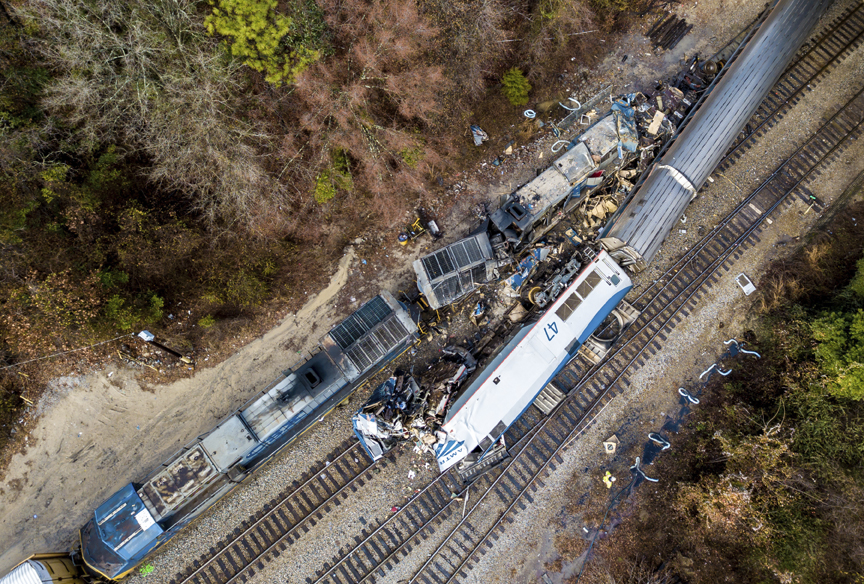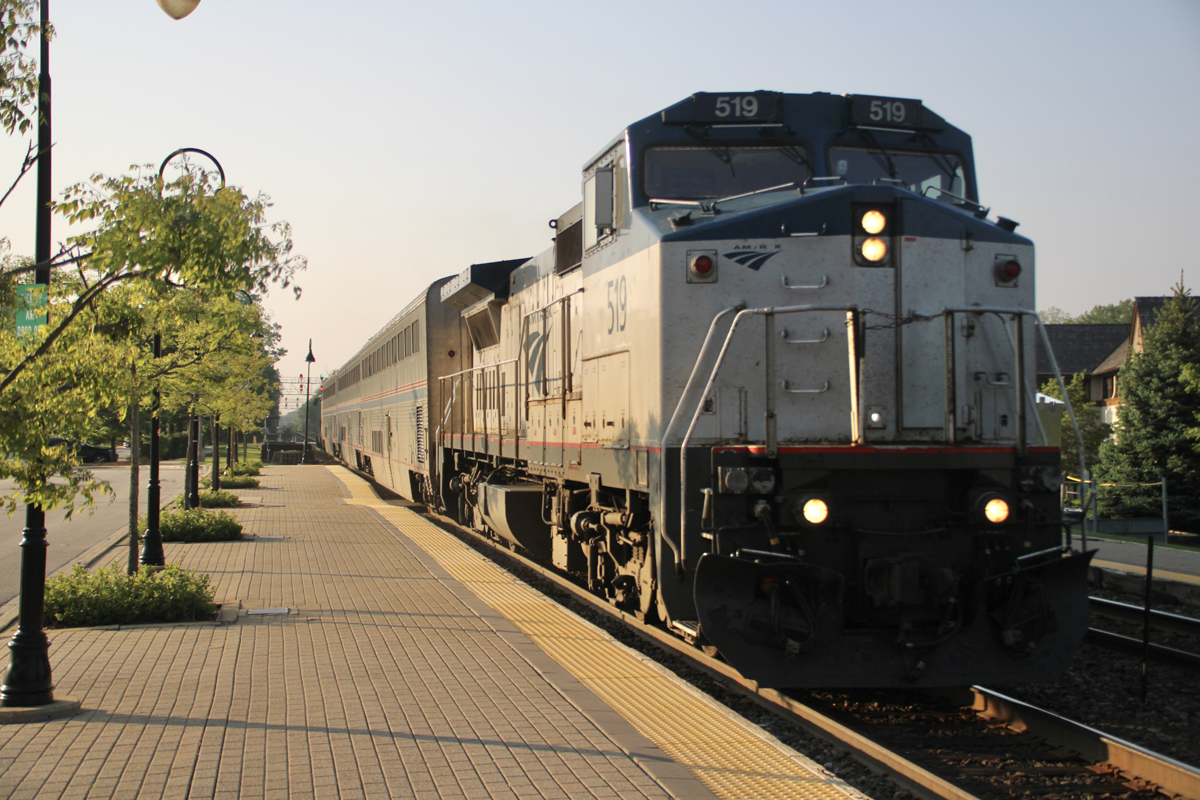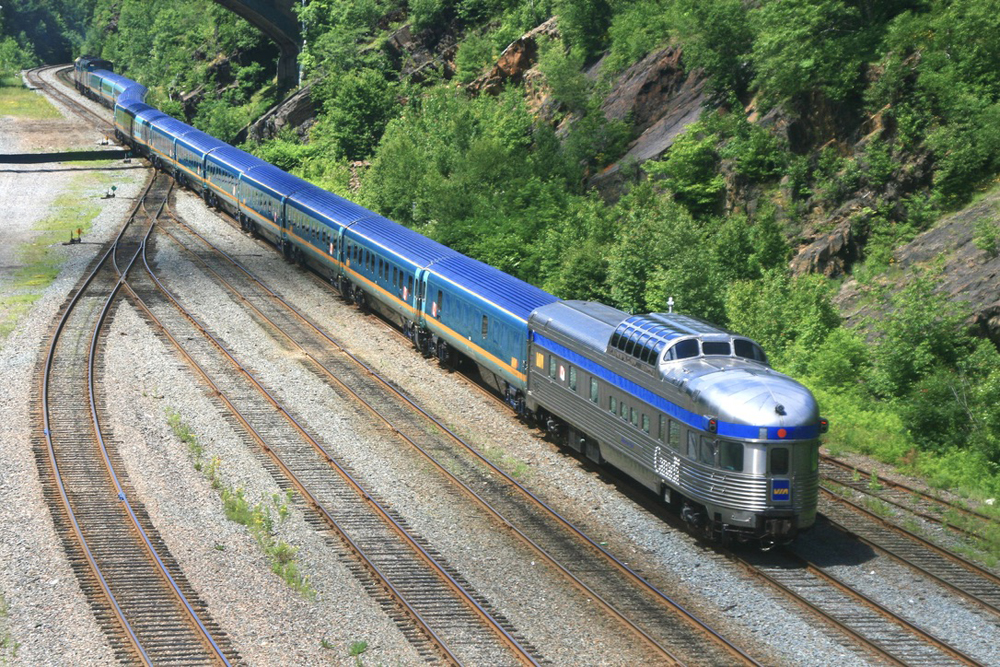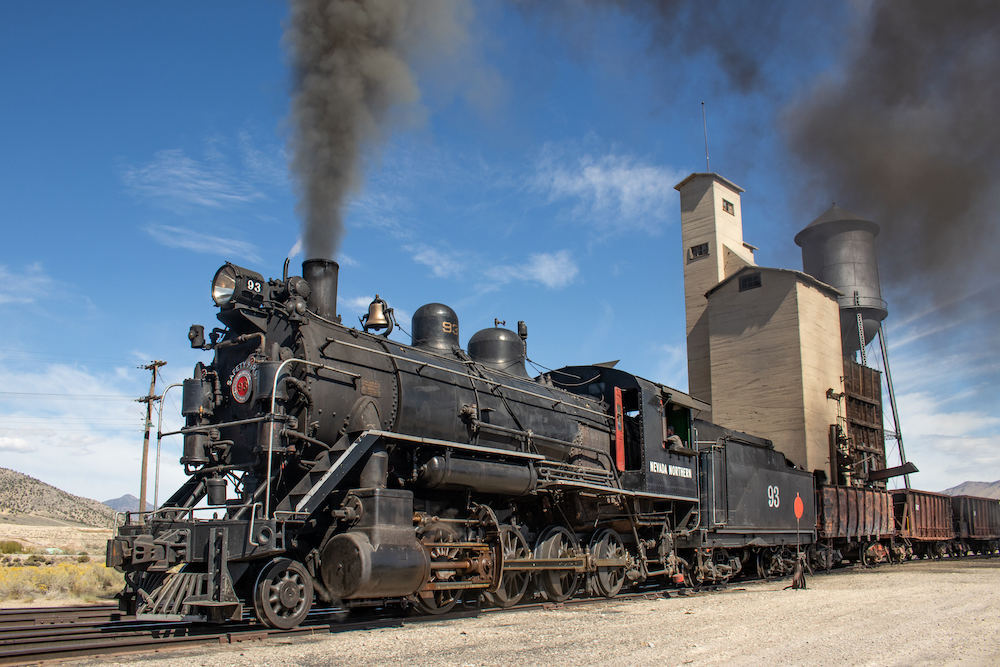JACKSONVILLE, Fla. — The widow of the conductor killed in Sunday’s crash of Amtrak’s Silver Star in South Carolina is suing Amtrak and CSX Corp. for negligence.
Christine Cella, widow of conductor Michael Cella, filed the suit Thursday in Duval County Circuit Court in Jacksonville, according to media reports. Cella and her two children live in a suburb of Jacksonville.
According a report in the Columbia, S.C., newspaper The State, a release from Cella’s attorney says the suit alleges 28 specific instances of negligence on the part of CSX and nine by Amtrak.
Cella, 36, and 54-year-old Michael Kampf were killed Sunday when the Silver Star went onto a siding and crashed into a parked CSX freight rain in Cayce, S.C.
It is the second suit filed as a result of the crash. An Amtrak passenger filed suit earlier Thursday against CSX.















@ Jim Buxton – previous articles here have mentioned that the signal system which is in place in that section, was suspended – ironically enough – for Positive Train Control installation. With the signal system temporarily out of service, the train dispatcher had nothing more to rely on than the word of the people out in the field as to whether switches were properly lined and locked.
@ Jerry Conway, please give consideration to the third paragraph of Stephen Armstrong’s post. Even when the private railroads were operating passenger train service before Amtrak, there were very few instances of individual trains operating at a profit; the bottom line was that passenger rail service WAS operated “for the common good”. as well as being a positive form of promotion for the particular railroad.
Except for the recent Acela affair all these recent accidents have been human error. People not paying attention to details that they were trained and payed to do. Why not, is a long list of questions and excuses. Simple fact, the switch was lined to the siding either by the crew of the struck CSX locos or if they entered from the other end, the previous user of that switch.
Running on track without train orders or anything as guidance when the signal system is down. Who’s kidding who ?
Suing Amtrak out of existence really! The movement of people by rail will never be profitable. Congress should just get over it. The rest of the world governments learned that a long time ago. Bottom line though it is still less expensive than roads or airplanes for the taxpayer. That is why the rest of the world is so far ahead in this field. Fewer special interests and not everything should be about shareholder value and profits sometimes the common good is the right thing to do.
The lawsuits will drag on for years until the guilty parties have made enough to pay the fines. In the end two lives have been needlessly lost, because of multiple human errors.
There are a number of lines without signals that carry passenger trains. When signals are down for, say, lightning strikes or work to change over to PTC, the railroad must necessarily be run “dark”, without signals.
While many of us might follow these people’s leads, wow, they sure didn’t waste any time! Within four days two people (including a bereaved widow who presumably was observing her mourning planning a funeral) had filed lawsuits against perceived responsible parties bearing deep pockets. And to allege 37 instances of negligence within those four days, too! Imagine! Sounds as if maybe an overzealous law firm got hold of the victims and sold ’em a quick bill of goods before a competitor could move in. My sympathies are with the aggrieved and I do not wish to make light of their unfortunately sad circumstances resulting from this tragedy. I’m simply stunned by the swiftness in which the justice system showed up on this occasion. Don’t such lawsuits normally occur many months following a disaster like this? Why the hurry? The victims surely have other urgent tasks right now.
Why would Amtrak run with no signals?
Amtrak had no control of the situation and therefore shouldn’t be blamed for the accident.
I agree with Charles L. and it was gross negligence to not inform the Amtrak crew to approach the facing point switch prepared to stop because there was no switch target signal and that dispatcher had no control of its position, as the CTC System was suppressed. Too bad there was not a CSX train that was next to go south ahead of Amtrak 91. It would then be a sole CSX wreck. It is not a case of it being an Amtrak wreck, and it there was no agreement to run Amtrak, there would not be a wreck. With that dispatcher performance, the next train, even a freight train would have had a head on crash. CSX is totally at fault..
If things keep.going the way they have, Amtrak will be out of business anyway. What company can afford to be shelling out $300m in damages every couple of years? It already doesn’t turn a profit, so how long will it be before the companies that provide the insurance decide against insuring the company. They are going to have to start spreading the blame when it comes down to it.
JERRY CONWAY — Comments on the article you linked:. Amtrak’s contracts with carrier RRs are no-fault, meaning Amtrak pays the claims no matter how badly the carrier RR screws up. This was the carrier’s blowback to Amtrak’s successful claim against Conrail which was at fault (Amtrak was the carrier in this case) at Gunpow, MD in 1989. A couple of comments: (1) Nobody likes no-fault but no-fault is what greases the wheels – the carriers would charge Amtrak more if they had to maintain coverage for their own torts. (2) The article implies that a judge can throw out the contract as in violation of the public interest, in the case of gross negligence on the carrier’s part. (3) Amtrak pays the price for operating on the cheap. Amtrak would be out of business if it were to pay the carriers the real cost of maintaining safe tracks and covering all contingencies. …. Bottom line: There’s a difference between a “stuff happens” tort, and CSX allegedly locking a switch in the wrong position which is a gross negligence tort. I’m not a lawyer and obviously I never read the contract even if I were a lawyer. My guess is, though, CSX will need to pay for this one.
Interesting.
http://www.foxnews.com/politics/2018/02/11/in-secret-deal-tax-backed-amtrak-pays-for-private-railroads-screwups-report.html
Quote from the article “….a parked CSX freight rain in Cayce, S.C. “
I wish everyone (Media) would get it correct. The crash occurred at Dixiana, S.C.
This is about five miles south of Cayce, S.C.
I think with Amtrak lawsuits even though they sue CSX, Amtrak pays the settlement for CSX if I am not mistaken via a liability fund it has setup. Anyone know? I am not sure CSX is on the hook financially even if they lose this case via their Amtrak carriage agreement.
I’m no lawyer but it seems to me that Amtrak is only responsible for workers’ comp which is no-fault and you don’t need to sue to get that. CSX is liable for tons of fault $$$$$$ due to gross negligence.
https://www.ble-t.org/pr/news/newsflash.asp?id=6065
I am an attorney who represents short line railroads, passenger entities, and public agencies in rail matters. Under most agreements between passenger providers whether Amtrak or a commuter rail agency and the “host railroad”, in any accident or other entity involving both the passenger and freight carriers, the passenger entity is responsible whether or not it caused the accident. Some agreements provide an exception for gross negligence or willful misconduct. This is the only basis on which freight railroads have been agreeable to having passenger service over their lines. These are commonly called “but for agreements.” Although I don’t know all of the facts, I’d suspect that CSX’s actions rise to the level of gross negligence. Also you should know that the current liability cap in the US is $295 million. Some “host railroads” want as much as $500 million in insurance coverage. One major US airline carries $1.1 billion in insurance.
Will someone enlighten me on a point made here. Although i may be mistaken, I thought that when there was an accident involving Amtrak on any railroad hosting Amtrak trains, not just CSX, Amtrak was responisble for the damages regardless of who was at fault. That is unless it involved a third party such as a grade crossing accident.
CSX will end up paying dearly for this.
“And a band of lawyers steals the show…”
Can’t say I really blame the survivors in this case. Someone at CSX really screwed the pooch on this one.
Mr. Norton, the freight was not on a spur, but on a sidetrack; there is a switch at the south end as well as at the north end..
As to why the switch was lined into the sidetrack and not for the main has not yet, as you say, been made public.
Jim Norton – when operating over switches, they must me lined and locked for the move. This is part of USDOT Federal Regulations, specifically 49 CFR Part 218, section 218.103(a)(6): “After operating a switch and before
making movements in either direction over the switch, ensure that the switch is secured from unintentional
movement of the switch points”. In this case the switch was properly lined and locked by the CSX crew for their move into the siding. Why it was not then lined and locked for the main after the CSX train was in the siding is a question that will be asked many times, by many people, to select individuals…
@Sammy – that is a completely different story. If these workers violated FMLA and faked medical leave because they were pissed off by CSX for working Xmas, then they should be investigated and punished, according to company policy, if wrong doing is found.
This is a 24 hour / 365 day working world now, and BLET workers should expect no more special treatment than anyone else. If they don’t like their work schedule, they should find another job.
Mr Robbins. One big difference in the 1987 wreck was that Conrail was operating on Amtrak tracks. This is the reverse Amtrak on CSX tracks.
Writing contracts to avoid liability is what lawyers get paid the big bucks for. Of course what is even funnier is watching losing clients then sue their lawyers(the lawyers who wrote the contract with the hold harmless, or you can’t she is when we really screw up, clauses) for malpractice after being exposed to 9 or 10 figure judgements.
In the deadly Chase, or Gunpow, collision of 1987, Conrail had thought it was protected against any damages. In that case, it was operating on Amtrak as opposed to this one with Amtrak operating on the freight carrier. If I remember correctly, the courts held that the negligence by the Conrail employee was so egregious that no matter what the contract said, Conrail was liable. After that, when we were putting liability provision into any contract, we’d refer to making it (using the name of the Conrail engineer in 1987 collision) as ______ proof. I don’t know the wording of the trackage rights contract that Amtrak uses over CSX, but even if CSX thinks they’re protected, they might have the same thing happen to them that happened to Conrail in 1987. I’m not sure of the legal principles involved, but it would seem that perhaps because of case or common law, you just are not allowed to make a contract that completely gets you out of liability – even if it appears iron clad that you are not liable. You also have to remember that this is a FELA case and not workmen’s compensation. Although Amtrak can offer a settlement to the widow, she doesn’t have to accept it and to get more she has to sue. So her best course is to name everyone involved – both Amtrak and CSX.
“And a band of lawyers steals the show…”. Jerry, I am not a lawyer. The widows deserve compensation from whomever was at fault and I’m confident they will get a larger settlement with lawyers representing them than if they didn’t have lawyers. This is not an action that should be handled pro se.
We still have not learned why a mainline switch was padlocked into a spur.